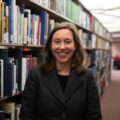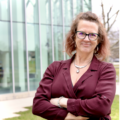Our Team
Learn more about the a2ru staff and our Executive Committee, a group of national leaders and innovators who help shape a2ru programs and policies.
Staff

Maryrose Flanigan is the executive director of the Alliance for the Arts in Research Universities (a2ru), where she oversees a network of universities which are committed to advancing arts-based and interdisciplinary research, practice, and teaching in higher education. She serves the executive committee for the arts initiative at a2ru’s headquarters at the University of Michigan; on the research advisory board for SNAAP; serves as an advisory board member for Winnow Literary: a journal of poetry and occupation; on the advisory board for VCUArts Qatar’s Institute for Creative Research; and is the a2ru liaison for Tradition-Innovations in Arts, Design, and Media Higher Education, a partnership between a2ru and the University of Nevada at Las Vegas’ College of Fine Arts.
Prior to joining the staff at a2ru, she served in various roles at the National Endowment for the Arts: as division coordinator for Literature and Arts Education, as a specialist for the creative writing and translation fellowships; and served as program manager for national programs Poetry Out Loud and the NEA Big Read. She has also served as associate editor for Office of Communications and Public Affairs (OCPA) at the Association of American Colleges and Universities (AAC&U); and associate director for the Association of Writers and Writing Programs (AWP). Maryrose has an M.F.A. in poetry from American University.


Shannon Fitzsimons Moen’s professional practice bridges the performing arts and higher education; in administrative, artistic, and educational roles, she has honed her ability to connect artists, educators, audiences, and ideas in unexpected and illuminating ways that spark dynamic discovery and growth.
Prior to joining a2ru, Shannon served as the inaugural University Programs Manager at UMS (University Musical Society), the performing arts presenter at the University of Michigan. Shannon designed and managed UMS’s portfolio of university-based arts-academic integration programs, which she grew to serve nearly 3,700 students in 2018-2019. Key initiatives included “Engaging Performance,” a team-taught course introducing U-M undergraduates to the performing arts through the lens of the UMS season; two granting programs for faculty to develop arts-integrative teaching skills; and a commissioned series of white papers and case studies on arts integration best practices for faculty.
Shannon also produced several UMS main stage performances and its Research Residency program each season. Projects included work by Yo Yo Ma, Ivo van Hove/Toneelgroep Amsterdam, the Takacs Quartet, Martha Graham Dance Company, Ping Chong + Company, Théâtre des Bouffes du Nord, Pulitzer Prize-winning composer Julia Wolfe, pianist Igor Levit, rapper/poet Omar Offendum, solo performer Edgar Oliver, and Alec Baldwin.
Prior to joining UMS, Shannon worked as a dramaturg, audience educator, and theatre writer for companies across the country including The Public Theater/Under the Radar, Oregon Shakespeare Festival, Steppenwolf, Lookingglass, California Shakespeare Theater, and African-American Shakespeare Company. She also designed and taught courses in American theatre history and dramaturgy at Northwestern University.
Educated at Hamilton College and Northwestern University, Shannon recently earned a master’s degree in Higher, Adult, and Lifelong Education at Michigan State University.

Christina Mozumdar has a background in arts administration, education, and community engagement, and she is passionate about using her skills to support organizations that make a difference in the world. Her experience includes developing and leading programs at the University Musical Society, the Center for Arts Education, and Creative Art Works. Christina has a Bachelor of Arts in Culture & Media from The New School and a Master of Social Work from the University of Michigan. In her free time, Christina enjoys exploring the outdoors, listening to podcasts, watching reality TV, and spending time with her family and friends.

Veronica Dittman Stanich holds a PhD in Dance Studies from the Ohio State University. Her interview- and observation-based research investigating audience responses to postmodern dance has been published in Dance Chronicle and Dance Research, and presented to the Congress on Research in Dance. Her work on the a2ru research team has resulted in workshops, whitepapers, and other resources concerning arts integration impacts; issues around tenure and promotion for the arts, design, and interdisciplinary practices; and interdisciplinary collaboration. Veronica is the Managing Editor of Ground Works, a2ru’s online platform for arts-integrated research.
Executive Committee

Steven Chodoriwsky is a Canadian designer, artist, writer, and educator. His research-centered practice engages with interdisciplinary arts spaces, performance platforms, and speculative acts of reading and writing with the built environment. His projects employ a diverse range of media including site-specific installation, workshops, publishing actions, theatre pieces, and audio-visual artifacts.
Based in Salt Lake City, he is Assistant Professor in the Division of Multi-Disciplinary Design at the University of Utah, where his research centers on experimental pedagogical models and their intersections with the institutional and spatial environments of the university campus. Prior to this, he taught at Cal Poly Pomona, Cornell, and at the University at Buffalo, where he held the Peter Reyner Banham Fellowship. He was educated in architecture at the Tokyo Institute of Technology and the University of Waterloo. He has also held extended art/design research positions at the Jan van Eyck Academie, Maastricht, and the Center for Contemporary Art, Kitakyushu.
Currently Artist-in-Residence at the Utah Museum of Contemporary Art, Chodoriwsky has exhibited and performed work at venues such as the Museum of Contemporary Canadian Art, de Appel Arts Centre, Amsterdam and the Suzuki Company of Toga International Theatre Festival, Japan, among many others. With curator Julie Niemi and designer Chris Lee he is a member of Collective Question, a research working group that studies structures of resistance through archives and exhibition production. As a writer, Chodoriwsky has contributed texts on spatial and cultural production to volumes of Scapegoat, San Rocco, C, and the Informal Market Worlds Atlas, among others. He is book designer of “Costume en Face” (Ugly Duckling Presse), co-editor/designer of “This is Not A Wall: Collected Short Stories of CODA’s Party Wall” (Cornell AAP/Actar), and is an independent publisher of experimental documents for organizations and events under the moniker Edits.

Oṣubi Craig is a multi-talented musician, arts administrator and engineer with comprehensive experience as an arts integration advocate, an education facilitator, ensemble director, and African Diasporic percussionist. Oṣubi brings a great deal of experience and energy to his role as the director of the Center for Arts, Migration, and Entrepreneurship (CAME) in the College of the Arts at the University of Florida (UF).
As a third-generation percussionist growing up in Brooklyn, NY, Oṣubi was immersed in the emerging African Diasporic cultural arts movement. His passion for science and technology led him to earn a B.S. degree in Industrial Engineering while minoring in Jazz Studies at Florida A&M University (FAMU). Oṣubi went on to earn an M.A. from Florida State University in Arts Administration. As an artist, he worked for major performing arts organizations, such as the Alvin Ailey American Dance Theater and National Dance Institute’s Arts-in-Education programs, served as lead drummer for Kulu Mele African Dance & Drum Ensemble (Philadelphia, PA), and was a teaching artist for the Philly Pops (Philadelphia, PA), NJPAC (Newark, NJ), Lincoln Center Institute Arts-in-Education program (New York, NY) and Urban Bush Women (Brooklyn, NY).
In his 20 + years of experience as an Arts Administrator, he has a proven track record of creating and implementing programming, cultivating community partnerships, crafting shared visions and strategic directions, and working effectively with partners within the Arts, higher education, and greater community.
He is a founder of SPARC352, a project of CAME and the UF Center for Arts in Medicine, which collaborates with researchers and community members to provide arts programming to the community to improve health and wellbeing outcomes.
In his role at UF, he was recognized with the Win Phillips Town and Gown Award for his work fostering relationships between the community, creatives and researchers to utilize the arts for positive social change. Additionally, Oṣubi has served as the college representative on the UF Council of Research Associate Deans (CORAD). His current research is a Robert Wood Johnson foundation supported partnership called Atunda, a collective of dancers and researchers using blockchain technology to protect the IP rights of dancers and choreographers.

Katie Dawson uses the arts to increase equity, access, and belonging in learning. She is an associate professor at The University of Texas in Austin, where she heads the MFA in Drama and Theatre for Youth and Communities and directs the Drama for Schools program. Katie is a UT Provost’s Teaching Fellow and heads Creative Collaborations for UT’s Planet Texas 2050, a transdisciplinary research project focused on climate resiliency and adaptation. Katie’s research and teaching has been acknowledged by multiple awards from her university and the American Alliance of Theatre and Education’s Winifred Ward Scholar Award, the Creative Drama Award, and a Distinguished Book Award.
Katie is a global thought leader and researcher on the impact of arts integration in education. She has multi-year research-practice partnerships with government and university leaders in Taiwan, Hong Kong, China, and Australia that investigate how to use drama to increase engagement in learning through culturally sustaining pedagogies. She has been awarded twelve grants from the U.S. State Department to run multiple projects with the U.S. Embassy system, local NGOs and interethnic educators in Bosnia and Herzegovina, Poland, and Croatia that use the arts to expand critical thinking and perspective taking in education. Katie has twenty years of experience leading major research initiatives on arts integration in K-12 education, in rural, urban, suburban, and borderland communities in the U.S. Currently, Katie is partnering with K-12 students and educators in Texas to re-design and research arts-integrated school curriculum focused on climate resilience. Katie’s co-authored books include: The Reflexive Teaching Artist: Collective Wisdom from the Drama/Theatre Field and Drama-Based Pedagogy: Activating Learning Across the Curriculum. Her new book, Drama for Schools and Beyond: Transformative Learning Through the Arts will be distributed by University of Chicago Press in September 2025.

Maryrose Flanigan is the executive director of the Alliance for the Arts in Research Universities (a2ru), where she oversees a network of universities which are committed to advancing arts-based and interdisciplinary research, practice, and teaching in higher education. She serves the executive committee for the arts initiative at a2ru’s headquarters at the University of Michigan; on the research advisory board for SNAAP; serves as an advisory board member for Winnow Literary: a journal of poetry and occupation; on the advisory board for VCUArts Qatar’s Institute for Creative Research; and is the a2ru liaison for Tradition-Innovations in Arts, Design, and Media Higher Education, a partnership between a2ru and the University of Nevada at Las Vegas’ College of Fine Arts.
Prior to joining the staff at a2ru, she served in various roles at the National Endowment for the Arts: as division coordinator for Literature and Arts Education, as a specialist for the creative writing and translation fellowships; and served as program manager for national programs Poetry Out Loud and the NEA Big Read. She has also served as associate editor for Office of Communications and Public Affairs (OCPA) at the Association of American Colleges and Universities (AAC&U); and associate director for the Association of Writers and Writing Programs (AWP). Maryrose has an M.F.A. in poetry from American University.


Jason Freeman is a Professor of Music at Georgia Tech, where he has taught since 2005. He has previously served as chair of the Georgia Tech Arts Council (2016 – 2019) and chair of the Georgia Tech School of Music (2018 – 2024). He currently serves as Interim Associate Vice Provost for the Arts, where he oversees the Institute’s strategic plan for the arts. This plan includes the development of new academic programs in arts+tech and the creation of a new campus arts district.
Freeman’s artistic practice and scholarly research focus on using technology to engage diverse audiences in collaborative, experimental, and accessible musical experiences. He also develops educational interventions in K-12, higher education, and informal learning contexts that broaden and increase engagement in STEM disciplines through authentic integrations of music and computing. He co-created EarSketch, a free online learning environment that has been used by over a million students worldwide to learn coding through music composition, production, and remixing.
His music has been performed at Carnegie Hall, exhibited at ACM SIGGRAPH, published by Universal Edition, broadcast on public radio’s Performance Today, and commissioned through support from the National Endowment for the Arts. Freeman’s wide-ranging work has attracted support from sources such as the National Science Foundation, the Blank Family Foundation, Google, and Amazon. He has published his research in leading conferences and journals such as Computer Music Journal, Organised Sound, NIME, and ACM SIGCSE. Freeman received his B.A. in music from Yale University and his M.A. and D.M.A. in composition from Columbia University.


Dr. Megan K. Halpern is the founder and director of Michigan State University’s Center for Interdisciplinary Research, Collaboration, Learning, and Engagement (CIRCLE), and an associate professor of Science and Society in MSU’s residential college for science, Lyman Briggs College. She studies the intersection of art and science, interdisciplinary collaboration, and public engagement with science. Notably, she co-edited the Routledge Handbook of Art, Science & Technology Studies, which introduces art-science studies as a coherent field of research. Her work often draws on arts research and research-through-design methodologies, and she incorporates arts-based pedagogical practices into her teaching. She earned her PhD in Science Communication from Cornell University and completed a Postdoctoral Research Fellowship at Arizona State University in the Center for Nanotechnology and Society and the Center for Science and the Imagination. Before earning her PhD, Dr. Halpern received a BA in studio art from Smith College. She worked as a set designer and scenic artist in New York City and in 1999, she co-founded Redshift Productions, a company that created performances inspired by science in collaboration with scientists.


Working in collaborative and cross-disciplinary modes, Kevin produces artworks, archives, and scholarship on such subjects as race and space, public memory, history of technology, and state violence. Recognition for his work has included grants from the National Science Foundation and National Endowment for the Humanities, presentation at conferences across Europe and North America (ISEA/ DEAF/CAA/NCA/ACM-SIGCHI), publication in edited journals and anthologies (Routledge/CCCS/Palm Press/UCLA), and invited residencies (Banff/USC-IML/Bratislava).
As an educator, administrator, and researcher, Kevin is focused on integration of practice-based, historical and theoretical approaches to learning about technological mediation. This work has included the development of several interdisciplinary project-based courses, workshops, and initiatives for students and faculty from the sciences, arts and humanities, with emphases on prototyping, reflection, and methodologies of collaboration.


Initially trained as an architect in her hometown of Sofia (the capital of Bulgaria), Sonia Hirt holds a master’s and a doctoral degree in urban and environmental planning from the University of Michigan. Prior to joining the University of Georgia, she served as Dean of the School of Architecture, Planning and Preservation at the University of Maryland in College Park; Associate Dean for Academic Affairs at the College of Architecture and Urban Studies, Virginia Tech; and Visiting Associate Professor at Harvard’s Graduate School of Design.
Sonia is the author/co-author of 85 scholarly and professional publications with 2,500 citations. Her latest article, on shrinking cities, co-authored with Professor Robert Beauregard of Columbia University, was published in International Planning Studies (2021). Sonia’s book “Iron Curtains: Gates, Suburbs and Privatization of Space,” published by Wiley-Blackwell, received the Honorable Mention for the Book Prize in Political and Social Studies sponsored by the Davis Center for Russian and Eurasian Studies at Harvard University. This award is given to an outstanding monograph in anthropology, political science, sociology, or geography. Her book “Zoned in the USA: The Origins and Implications of American Land Use Regulation,” published by Cornell Press, received several academic honors. These include the Honorable Mention for the 2015 Best Book Award of the Urban Affairs Association; shortlist for the Best Book Award of the International Planning History Society; one of the Ten Best Books in Urban Planning, Design and Development of 2015 by Planetizen; list of Outstanding Academic Titles by Choice Magazine; and the biennial John Friedmann Best Book Award by the Association of Collegiate Schools of Planning. In 2019, Planetizen named the book one of fourteen Top Urban Planning Books of the Decade (2010-2020). In 2020, Book Authority ranked it in the Top Forty Land Use Law Books of All Time.
Sonia is also the editor of “The Urban Wisdom of Jane Jacobs” (with Diane Zahm), published by Routledge, and the author of “Twenty Years of Transition: The Evolution of Urban Planning in Eastern Europe and the Former Soviet Union, 1989-2009” (UN HABITAT; with Kiril Stanilov). She is an elected Fellow of the American Institute of Certified Planners. She is currently the Editor-in-Chief of the Journal of Planning History (JOPH)—the official peer-reviewed journal of the Society for American City and Regional Planning History (previously, she was Co-Editor-in-Chief of JOPH). Through her career, she is or has been member of the editorial boards of ten scholarly journals, including Planning Perspectives, Planning Research and Practice, and Urban Design International.
Sonia’s scholarly interests focus on the interactions between social and cultural values and the urban built environment. Through her scholarship and teaching, she aims to advance understanding of the relationships between social processes, cultural values, and urban forms, and to create opportunities to make cities more equitable, prosperous, and sustainable. Her research has both a theoretical and an applied perspective. She strives to enhance the quality of urban environments by developing a richer theoretical understanding of the social processes and cultural values that influence their evolution. She also strives to provoke critical debates within the design and planning professions and thus contribute to innovation in practice.


As Learning Technologist for the University of Nevada, Las Vegas College of Fine Arts, Dr. Yvonne Houy supports faculty in all of its seven areas (Architecture, Art, Entertainment Engineering Design, Dance, Film, Music and Theatre)—over 120 tenured and tenure-track faculty, part-time professors of practice and graduate teaching assistants. Her goal is to improve faculty satisfaction and student learning outcomes through a wide variety of online educational resources for in-person, hybrid and fully online courses.
A graduate of Cornell University (M.A. & Ph.D.) and the University of California, Berkeley (B.A.), and former Visiting Assistant Professor at the highly selective, liberal arts-focused Pomona College, Dr. Houy understands the needs and challenges of higher education institutions that value research, teaching, and diversity. This is enhanced by her interdisciplinary career: After earning her Ph.D. in the Humanities with a media studies emphasis, she followed her interest in online learning technologies and computer programming to become a learning technologist and professional development facilitator.
Believing deeply in the power of learning to drive equity, she is an active member of the international Computer Science For All movement, and, since 2016, a national professional development facilitator for the Code.org Advanced Placement Computer Science Principles curriculum. At the regional level, she has produced events such as the Las Vegas Maker Faire, the local STEAM educators’ showcase Explore.Learn.Inspire., the interdisciplinary Las Vegas Make-a-thon 2.0 on the future of experience design, and online transdisciplinary design charrettes to transform arts education. In all these projects and her courses she enjoys teaching artists and designers how to use coding and mobile app development as a new creative “canvas.”
Influenced by Aikido and transformative mediation, she is known in the UNLV community as a resource who bridges divergent perspectives for productive collaborations. She facilitates challenging and complex conversations such as for Design Sprints and conflict mediations. She serves on the UNLV Faculty Technology Advisory Board and as the UNLV Faculty Senate representative for the UNLV AI policy committee, and is the founding editor of Tradition-Innovations in Arts, Design, and Media Higher Education, a new peer-reviewed digital journal.
Her scholarship focuses on socially and culturally disruptive mobile technologies, propaganda technologies and techniques, and research-based best practices for online student engagement, which is intertwined with her interests in Flow experiences, mental states conducive to productivity and creativity, and her 15+ years of experience in Aikido, the martial art known for balancing conflict resolution and collaboration.


American conductor Craig Kier has conducted performances in some of the most significant opera houses throughout the United States and on international stages. He is a School of Music Professor at the University of Maryland and in 2023, joined the Arts and Humanities Dean’s leadership team as Director of the campus-wide Presidential initiative, Arts for All.
As Director of the Maryland Opera Studio (MOS), Kier expanded the footprint of the program’s activities, connecting the MOS curriculum and programming to areas across campus and beyond. In addition to his work as a conductor, his research includes the exploration of combining virtual reality with diverse musical genres to increase access to music and how such technologies can be utilized in medicine. His research has been published in the journal Pain and presented at virtual reality conferences throughout the United States.
He has also established an annual commissioning prize as part of the Maryland Opera Studio New Work Reading Series, engaging historically underrepresented composers and librettists to cultivate their creative voices, allowing emerging artists an opportunity to work directly with a creative team on a work written specifically for them, and audiences an opportunity to be exposed to new work and observe the creative process. Along with his dedication to the development of New Work, Kier was a key member of the planning committee for the UMD campus wide 2018/2019 Year of Immigration which included serving as Artistic Director for the festival celebrating the works of Kurt Weill. In collaboration with The Kurt Weill Foundation for Music, this year-long festival created programming and curriculum that included nearly every area of the UMD School of Music.
In 2023, Kier joined the Arts and Humanities Dean’s office as Director of the campus-wide Presidential initiative, Arts for All, and currently serves as Advisor for the Maryland Opera Studio. In 2020, he was named Artistic and Music Director of the Annapolis Opera, where he continues to lead performances, programming, and community engagement activities.


Carly Lettero is Associate Director of Arts, Science, Humanities and Technology Integration at Oregon State University’s Patricia Valian Reser Center for Creative Arts (PRAx). She also directs the Spring Creek Project, a program that, for more than 20 years, has been bringing together the practical wisdom of environmental science, the clarity of philosophy, and the transformational power of the written word and the arts to envision and inspire just and joyous relations with the planet and with one another. Carly envisions and builds programs and residencies, nurtures collaborations and supports thinkers and creatives. She thrives at intersections—places where ideas and people and disciplines come together to imagine new stories and solutions to the world’s most pressing problems.


Laura Levin is Associate Professor of Theatre and Performance at York University (Toronto) and York Research Chair in Art, Technology, and Global Activism. Her research focuses on site-specific, immersive, and intermedial performance; art, human rights, and environmental justice; and research-creation methodologies. Levin has published numerous articles and journal issues on site-specific, digital, and political performance; is former Editor-in-Chief of Canadian Theatre Review; and author of award-winning books Performance Studies in Canada (2018, with Marlis Schweitzer) and Performing Ground: Space, Camouflage, and the Art of Blending (2014), the latter exploring activist approaches to space in performance by women and artists from marginalized communities. She is Editor of Theatre and Performance in Toronto (2011), Conversations Across Borders (2011), a collection of dialogues on performance and border culture with Guillermo Gómez-Peña, and a book on queer feminist performance art icon Jess Dobkin (Jess Dobkin’s Wetrospective), forthcoming in Fall 2024.
Levin has significant experience leading large-scale transnational and collaborative research-creation projects. She is Principal Investigator (PI) and Director of Hemispheric Encounters Network, a SSHRC Partnership Grant exploring performance’s potential for addressing shared human rights and environmental justice issues across the Americas and enacting social change (hemisphericencounters.ca). She is also Director of Sensorium: Centre for Digital Arts & Technology, an organized research unit at York, which promotes scholarly inquiry and creative experimentation in performance and digital culture. In this role she supports arts researchers in dreaming up and developing community-engaged, digital research-creation methodologies. Relatedly, Levin serves as Community Partnerships Lead on the CFREF grant, Connected Minds (https://www.yorku.ca/research/connected-minds/), a Sensorium-supported initiative spanning the arts, sciences, engineering, and law. Here, she provides strategic direction on partnered research addressing social impacts of AI and other disruptive technologies.
Laura is a practicing artist and has worked as a director, dramaturg, curator, and performer on community-engaged and digitally inventive installations that meet audiences on an intimate level, engaging participants sensorially in stories of place that promote understanding of underrepresented social experiences—from staging hidden urban stories in shoebox cinemas at Toronto’s Bata Shoe Museum (ARCADE, 2016; with Shauna Janssen, Stephen Lawson, and Aaron Pollard), to creating mobile archives of performance memory that you can carry in small pouches that fit in your pocket (Talixmxn, Mexico City, 2019; with Jess Dobkin), to developing (as dramaturg) a performance exhibition and AR app that which conjure, through cast-off ephemera of the everyday, vibrant histories of local activism within queer communities (Jess Dobkin’s Wetrospective, 2021). Most recently, she partnered (as dramaturg and co-creator) with digital theatre company SpiderWebShow to build a prototype for staging live theatre in VR—a response to the detrimental effects of COVID-19 on the arts sector and the need to make theatre safe and accessible for geographically dispersed audiences. Using as a springboard an immersive play on Toronto’s 2010 G20 summit protests, You Should Have Stayed Home (directed by Michael Wheeler) has toured to many XR arts festivals and international events.

Lisa D. McNair is a Professor of Engineering Education at Virginia Tech and Deputy Executive Director of the Institute for Creativity, Arts and Technology (ICAT). From 2018 to 2023 she was Director of the Center for Educational Networks and Impacts (CENI), the education, outreach, and engagement arm of ICAT. She has held leadership positions in the university’s interdisciplinary initiatives and served as Assistant Department Head of Graduate Programs and Chair of the Promotion & Tenure Committee in the VT Engineering Education department. In 2013 she began training as a sculptor and stone carver with Bob Lockhart and Darcy Meeker and applies this experience to both her art and to collaborative education. Her overarching goal is to create learning experiences that are research-informed and that transverse perspectives within and beyond the university. Her funded NSF projects have included revolutionizing the culture of the VT ECE department, identifying practices in intentionally inclusive Maker spaces, and exploring professional identity development in Civil Engineering students with disabilities. She is currently conducting ethnographic research on historical and social forces shaping cold climate building projects in Alaskan housing and beginning a collaborative project with researchers from the arts, neuroscience, and immersive technologies to bridge physical and disciplinary distances. Her work in CENI focuses on building networks between the university and multiple community sectors and supporting engagement in science, engineering, arts, and design. In addition to directing 11 PhD dissertations and serving on an additional 17 PhD committees, Dr. McNair has funded and mentored 6 post-graduate scholars (5 PhD, 1 MFA) with a range of professional accomplishments and goals, including scholars seeking tenure-track positions as well as academic and industry-based administrative careers. She earned a PhD in Linguistics at the University of Chicago, and an M.A. and B.A. in English at the University of Georgia. ORCID: https://orcid.org/0000-0001-6654-2337


Matt Nolan is a Lecturer of Immersive Media Design in the Department of Computer Science at the University of Maryland. Matt started on the administration side of higher education in 2008, and eventually found his pace and passion for teaching. He holds an MFA in Visual Art/New Media from George Mason University(’22), a Master’s of Music in Music Composition from George Mason University(’12), and. Bachelor of Music in Music Synthesis as a voice principal from Berklee College of Music(’07). Matt previously served as Assistant Professor of Game Sound and Music and co-founding member of the Computer Game Design Department at George Mason University
With roots as a singer and musician, his work in technology, interactivity, and the arts has constantly embraced new interfaces and novel approaches to artistic expression. Matt has 28 music publications under his belt. He freelances on game and film projects and ran his own independent game design studio, Puddle Jump Games.
Presentations, performances, and talks include: The New York Electronic Arts Festival/ New Interfaces for Musical Expression, The Florida Electro-acoustic Music Festival, The Seoul International Computer Music Festival, The Hirshhorn, The East Coast Games Conference, and TedX. Matt has had nine recent exhibitions and installations of his artwork. In addition to his work in technology and the arts, Matt is a certified Permaculture designer and spends time working on projects in nature.


Rogério M. Pinto is Associate Dean for Research and Innovation and Berit Ingersoll-Dayton Collegiate Professor of Social Work at the University of Michigan’s School of Social Work; he is also Professor of Theatre and Drama in U-M’s School of Music, Theatre & Dance.
Born in Belo Horizonte, Brazil, Pinto focuses on finding academic, sociopolitical and cultural venues for broadcasting voices of oppressed individuals and groups. Funded by the National Institute of Mental Health, his community-engaged research focuses on the impact of interprofessional collaboration on the delivery of evidence-based services (HIV and drug-use prevention and care) to marginalized racial/ethnic and sexual minorities in the United States and Brazil. Pinto conducts art-based scholarly research. He performed “Marília,” a one-person play, on New York City’s Theatre Row in 2015 and at the University of the Free State in Bloemfontein, Vrystaat, South Africa in 2016. “Marília” won the United Solo Festival Best Documentary Script. In “Marília,” Pinto explores the tragic death of his three-year-old sister and how it haunts and inspires the family she left behind. Funded by the University of Michigan Office of Research and several other sources, he built the “Realm of the Dead,” an art installation to investigate his own marginalization as a gender non-confirming, mixed-race and Latinx immigrant. “Realm of the Dead” was presented at the School of Social Work as part of its Centennial celebration in 2021.

Jinsil Hwaryoung Seo is the Associate Dean for Research and Creative Works at Texas A&M University’s School of Performance, Visualization, & Fine Arts. She is also the founding director of the Soft Interaction Lab and serves as the director of the Institute for Applied Creativity. Seo holds a PhD degree in Interactive Art and Technology from Simon Fraser University in Canada and an MFA degree in Computer Arts from the School of Visual Arts (SVA) in New York.
Seo’s interdisciplinary art practice explores the intersection between the human, nature, and technology. Her research aims to engage diverse audiences through embodied and immersive interactions, fostering meaningful relationships within artworks and with participants. Her creative practice and research center on interactive art, as it encourages immersive experiences. Throughout her career, Seo has developed tangible interfaces and mixed reality learning applications for STEAM education, medical/nursing education, and social awareness. Her research has received support from various organizations, including the National Science Foundation, National Endowment for the Arts, and Health Resources & Services Administration.
Seo’s interactive art has been showcased locally, nationally, and internationally at notable venues such as ISEA, SIGGRAPH ASIA, IDMAA, TEI, and Creativity & Cognition. Her contributions extend to publishing in various journals and conference proceedings, covering topics like tangible/embodied interaction, interactive design, participatory design, and learning technology.
